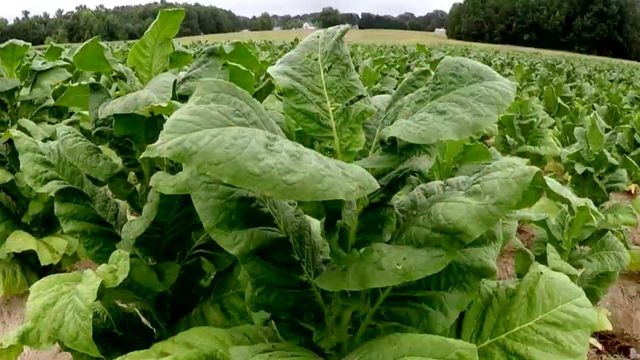Cutting nicotine in cigarettes pits smokers' lives against tobacco farmers' livelihoods
In addition to the tariffs and ongoing international trade war, North Carolina tobacco farmers face a new hurdle to selling their crop: The U.S. Food and Drug Administration is pushing to reduce nicotine levels in cigarettes to non-addictive levels to help curb smoking.
"Nicotine lives at the core of both the problem and, ultimately, the solution to the question of addiction," FDA Commissioner Scott Gottlieb said in March. "Those potential generational health benefits could be staggering in terms of life years gained and economic costs avoided."
Smoking is linked to nearly a half million American deaths each year. At the same time, tobacco has a storied history in North Carolina, which has long been the No. 1 tobacco-producing state in the nation.
"This is just another battle that tobacco growers have to face," said Tim Yarbrough, a Caswell County tobacco farmer.
Although the state grows only half the amount of tobacco it did 20 years ago, the prospect of changing their cash crop would impact about 1,500 farm operations across the state.
"Am I still going to be in business or not?" wonders Jonathan Renn, a Franklin County tobacco farmer.
Sixty percent of North Carolina tobacco is sold overseas, and Graham Boyd, executive vice president of the Tobacco Growers Association of North Carolina, said the U.S. already faces tough competition from countries that wouldn't face the same nicotine restriction.
Both the association and the North Carolina Department of Agriculture and Consumer Services have raised concerns about the FDA plan.
"What matters to us is, does this put us at a competitive disadvantage in the marketplace from a global perspective?" Boyd said.
Loren Fisher, the Philip Morris Professor in the Crop and Soil Sciences Department of North Carolina State University, also noted that reducing nicotine in tobacco plants is no easy task.
"Those varieties don't exist," Fisher said. "It would take some time with plant breeding. It would be a conventional breeding program. If you were starting at ground zero, it could take 10 to 12 years."
Genetically modified plants would provide a quicker transition, but Fisher said international buyers are leery of GMO products.
"That is not accepted by consumers and especially our customers outside the U.S. who purchase tobacco that we grow in the United States," he said. "Transgenic tobacco is not acceptable."
"It seems like an oxymoron to me," Boyd said of GMO health concerns for a product already linked to cancer.
The FDA acknowledges that nixing nicotine might not end addiction or reduce smoking.
"If they go to zero nicotine, we don't know if that'll reduce smoking or increase smoking," Yarbrough said. "We don't know that, and I don't think they know that."
Still, he worries that the push could put him out of business.
"I think it's possible, very possible," he said.











